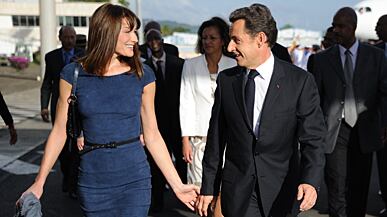Who gets pregnant at age 40 or over? Typically, it's married, educated women using donated eggs.
1. In the EU, where French first lady Carla Bruni lives, the percentage of births to mothers age 40 and over has nearly doubled since the late 1980s, from 1.6 percent to 3 percent.
"Fertility rates have increased due to fertility treatments," says women's health educator Toni Weschler, the author of Taking Charge of Your Fertility. "More and more women over 40 can get pregnant now, but those statistics are misleading, because they're able to conceive only because of science. It's no easier now than ever to get pregnant over 40 naturally.”
F.C. Billari, et al. Social age deadlines for the childbearing of women and men. Human Reproduction (2011): 26 (3), 616-22.
2. More women age 40 and older have given birth in Italy, Bruni's native country, than in any other Western industrialized nation; 4 percent of births in Italy are to women over 40, compared to 2.6 percent in the U.S. and 2.2 percent in the Netherlands.
"Potentially it's because in a Catholic country such as Italy, they're less likely to use birth control," muses Weschler. "In a Catholic country, they might say, 'Let's leave it to God,' whereas women over 40 in the United States wouldn't so likely take that chance."
F.C. Billari, et al. Pushing the limit: Long-term trends in late fertility in Sweden. Max Planck Institute for Demographic Research, working paper, 2007. ( pdf)
3. In the U.S., the birth rate among women age 40 to 44 increased 6 percent between 2007 and 2009.
And older women comprise the only age group whose birth rate is now on the rise in the U.S., according to the Centers for Disease Control researchers who conducted the study that yielded this statistic. The birth rate among women age 50 and older rose by 4 percent between 2008 and 2009.
Brady E. Hamilton, et al. National Vital Statistics Reports, U.S. Centers for Disease Control and Prevention (2010): 59 (3) ( pdf)
Gallery: Fortysomething Moms

4. One-fourth of women who gave birth at age 40 or older say they feel self-conscious around other moms because of their age.
"The reality is that it's not easy being an older parent," says registered nurse Tori Kropp, author of The Joy of Pregnancy: The Complete, Candid and Reassuring Companion for Parents-to-Be. "It sounds like a great idea at first, but suddenly you're 50 and have 5-year-old twins. It can quite simply be an energy factor. Of course, there are plenty of parents who kick the soccer ball and coach the baseball team, but the older mother becomes less and less likely to crawl on the floor with the baby. Parenting is a rough road for for the older parent who has less flexibility."
Survey: What Is the Best Age to Have a Baby? Parenting/Babytalk, April 2010.
5. Four percent of women who gave birth at age 40 or over cite "the disapproval of others" as a drawback to being an older mom.
More than 15,000 mothers responded to this survey organized by Parenting magazine. In it, 54 percent of moms age 24 or younger reported having felt judged harshly by older moms, compared to only 12 percent of older moms who reported having been scorned by younger moms as being not energetic enough for the task of motherhood.
Survey: What Is the Best Age to Have a Baby? Parenting/Babytalk, April 2010.
6. 80 percent of U.S. women who give birth for the first time in their late thirties or early forties have at least some college education.
According to the book in which this statistic appears, 60 percent of women age 35 and over who had babies in the U.S. in 2003 had a bachelor's degree or higher, compared to 26 percent of all first-time mothers of any age that year. That's probably because one of the main reasons women delay pregnancy is because they want to focus on their educations and careers first, Kropp says. "The natural tendency of an older parent is to be more cerebral.”
Gregory, Elizabeth. Ready: Why Women Are Embracing the New Later Motherhood. New York: Basic Books, 2007; page 30.
7. 85 percent of women who have their first babies during their late thirties or early forties are married when they give birth, compared with only 18 percent of teenage mothers.
And this factor significantly increases the chances of stability — emotional and financial — in the homes where those babies grow up, notes the author of the book in which this statistic appears.
Gregory, Elizabeth. Ready: Why Women Are Embracing the New Later Motherhood. New York: Basic Books, 2007, page 9.
8. 76 percent of mothers age 40 and over read to their children at least once a day, compared to 68 percent of mothers age 30 to 39 and 57 percent of those age 18 to 29.
A whopping 89 percent of mothers age 40 and up claim to "always have books on hand," compared to 65 percent of mothers under 30, according to a study commissioned by General Mills. The older moms are also nearly twice as likely to visit libraries with their children: 53 percent vs. 32 percent. According to the same study, a mother age 40 or over is also more than twice as likely as an under-30 mother to report that her child owns at least 50 books: 58 percent vs. 26 percent.
"Reading Ranks as the Top Daily Activity Moms Spend Doing With Their Child." Survey conducted by Ipsos Public Affairs for General Mills (2010).
9. Women who give birth after age 35 are 58 percent less likely to get ovarian cancer than women who never had children.
This good news counteracts the bad news in studies suggesting that women who first give birth later in life "have a significantly higher risk of breast cancer," Weschler notes. "When it comes to risk factors and pregnancy, there are so many variables."
Malcolm C. Pike, et al. Hormonal factors and the risk of invasive ovarian cancer: a population-based case-control study. Fertility and Sterility (2004): 82 (1), 186-95.
10. When attempting in-vitro fertilization with their own eggs, 85 percent of women in their forties fail to conceive.
"So many women tell me that if all these movie stars are getting pregnant in their forties and fifties, then surely it can't be so difficult," Weschler says. "But I'm sure what's really going on is that these celebrities are using donated eggs” from younger women, because after age 40, women's eggs are highly compromised. "It angers me that these celebrities getting pregnant later in life are now the standard reference on which the average woman bases her feelings of inadequacy."
F.C. Billari, et al. Pushing the limit: Long-term trends in late fertility in Sweden. Max Planck Institute for Demographic Research, working paper, 2007 ( pdf).
11. The proportion of women who become pregnant with twins via assisted reproductive technology increases from less than 5 percent among women in their twenties to more than 40 percent among women over 40.
During that same age span, the percentage of ART-assisted triplet pregnancies soars from 40 percent to 80 percent. "Pregnancies conceived by assisted reproductive technology accounted for an increasing number of multiple gestations in older women," write the authors of the study that yielded this stat, who warn: "In women with lower socioeconomic status, older age was associated with higher risks of poor perinatal outcomes in twin pregnancy. However, in women with higher socioeconomic status, older women did not have a higher risk of poor perinatal outcomes than younger women."
Jun Zhang, et al. Multifetal pregnancy in older women and perinatal outcomes. Fertility and Sterility (2002): 78 (3), 562-568.
12. Women who have babies at age 40 or older reduce the mortality rates of their own brothers by 20 percent.
That is, if each of those brothers has at least three sisters altogether, according to a study of the influence of family history on longevity, based on 79,000 Utah pioneers born between 1870 and 1909.
Richard Kerber et al. Familial excess longevity in Utah genealogies. Journal of Gerontology: Biological Sciences (2001): 56A (3), 130-9.
13. The risk of giving birth to a child who will later be diagnosed with autism is 50 percent higher for a woman of 40 than for a woman between the ages of 25 and 29.
This report by researchers in the Department of Public Health Sciences at the University of California, Davis, flung another can of lighter fluid on the already-flaring what-causes-autism debate. In the report, its authors wrote that "the recent trend toward delayed childbearing" played a key role in the 4.6 percent increase in autism diagnoses in California over the last decade.
J.F. Shelton, et al. Independent and dependent contributions of advanced maternal and paternal ages to autism risk. Autism Research (2010): 3 (1), 30-9.
"It angers me that these celebrities getting pregnant later in life are now the standard reference on which the average woman bases her feelings of inadequacy."
14. 20 percent of the children of mothers aged 40 and over are delayed in their ability to sit up by themselves.
A study commissioned by the Canadian government found delays in physical development among children of older mothers, compared to children of younger mothers. The study also found that 14 percent of older mothers' children utter their first words later than younger mothers' children, and 19 percent of older mothers' children take their first steps later than younger mothers' children.
Tracey Bushnik and Garner, Rochelle. The children of older first-time mothers in Canada: their health and development, for Statistics Canada.
15. Children with older mothers are three times as likely as children with younger mothers to have food allergies.
"The prevalence of food allergies is increasing. Concurrently, the average maternal age at birth is also increasing," write the authors of the study that yielded this statistic. Confirming their suspicions, their research determined that "the presence of a food allergy in children was related to older maternal age at delivery. Additional studies are needed to further evaluate this relationship and its potential implication in preventive strategies for food allergies in children."
A.F. Dioun, et al. Is maternal age at delivery related to childhood food allergy? Pediatric Allergy and Immunology (2003): 14 (4), 307-11.
Anneli Rufus is the author of many books, including Party of One: The Loners' Manifesto and the Nautilus Award-winning Stuck: Why We Don't (or Won't) Move On, and the coauthor of still more, including Weird Europe and The Scavengers' Manifesto. Her books have been translated into numerous languages, including Chinese and Latvian. In 2006, she won a Society of Professional Journalists award for criticism.






